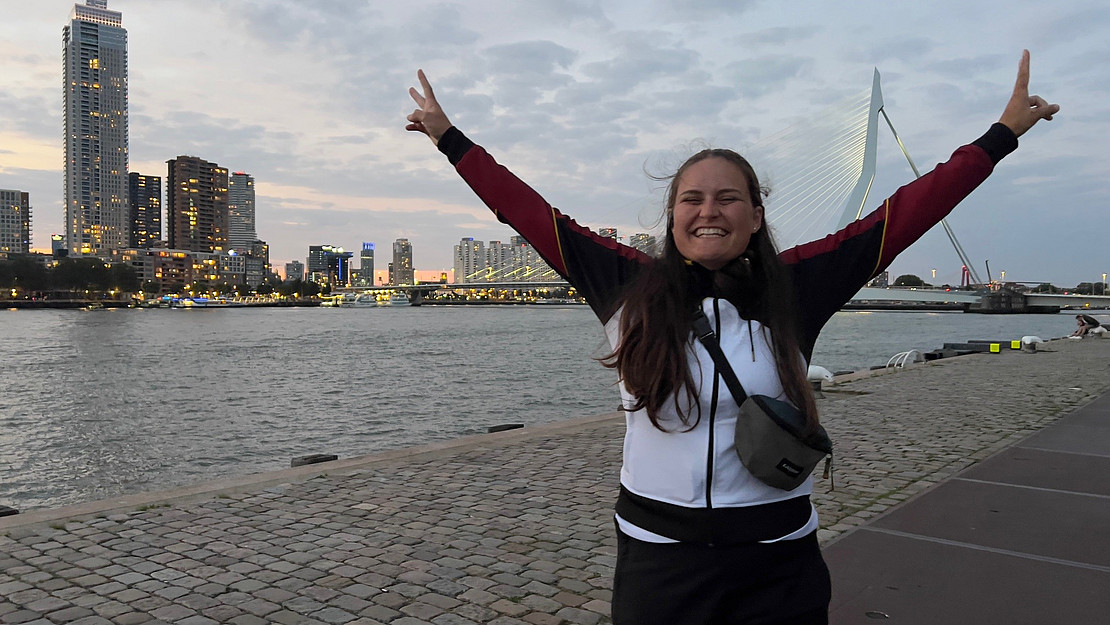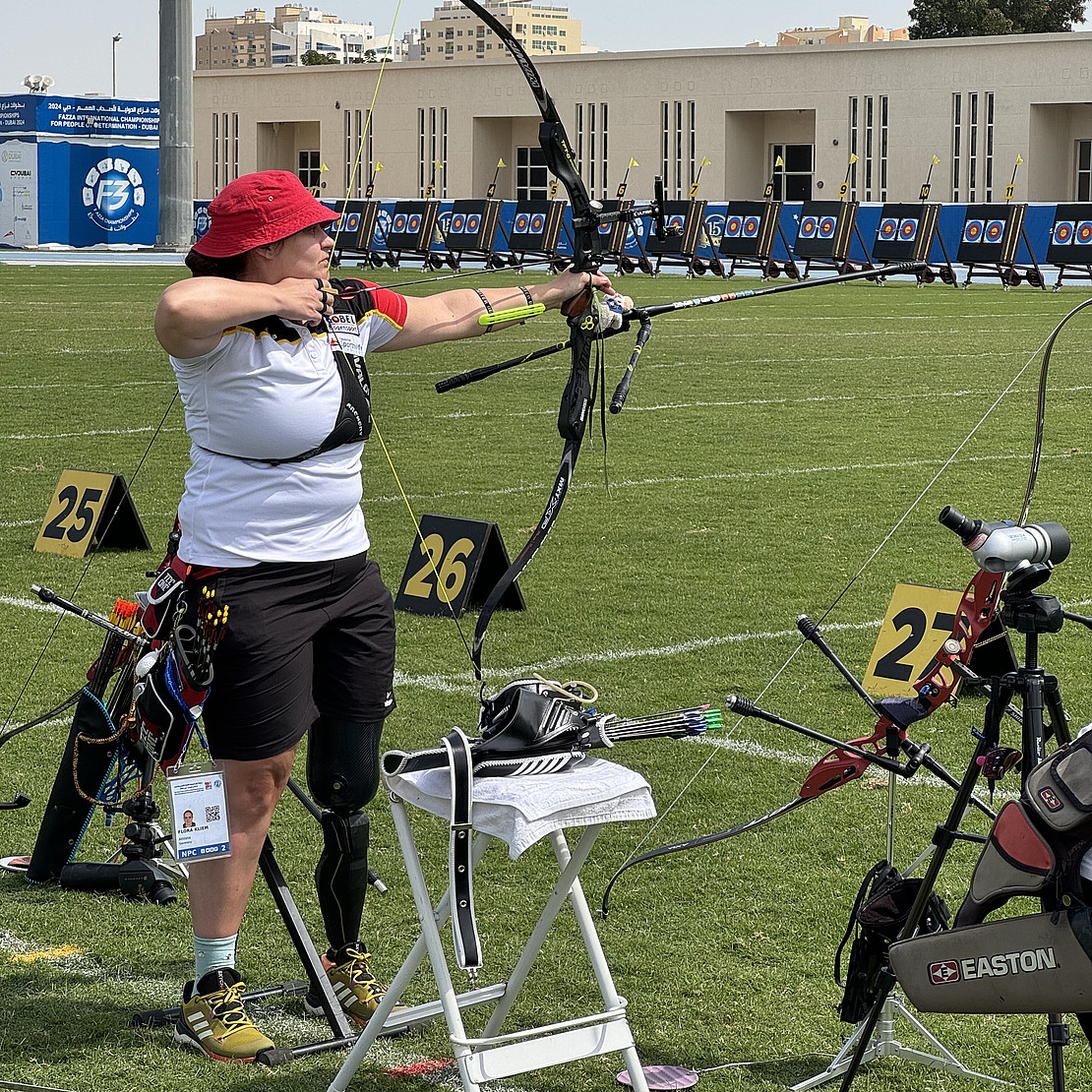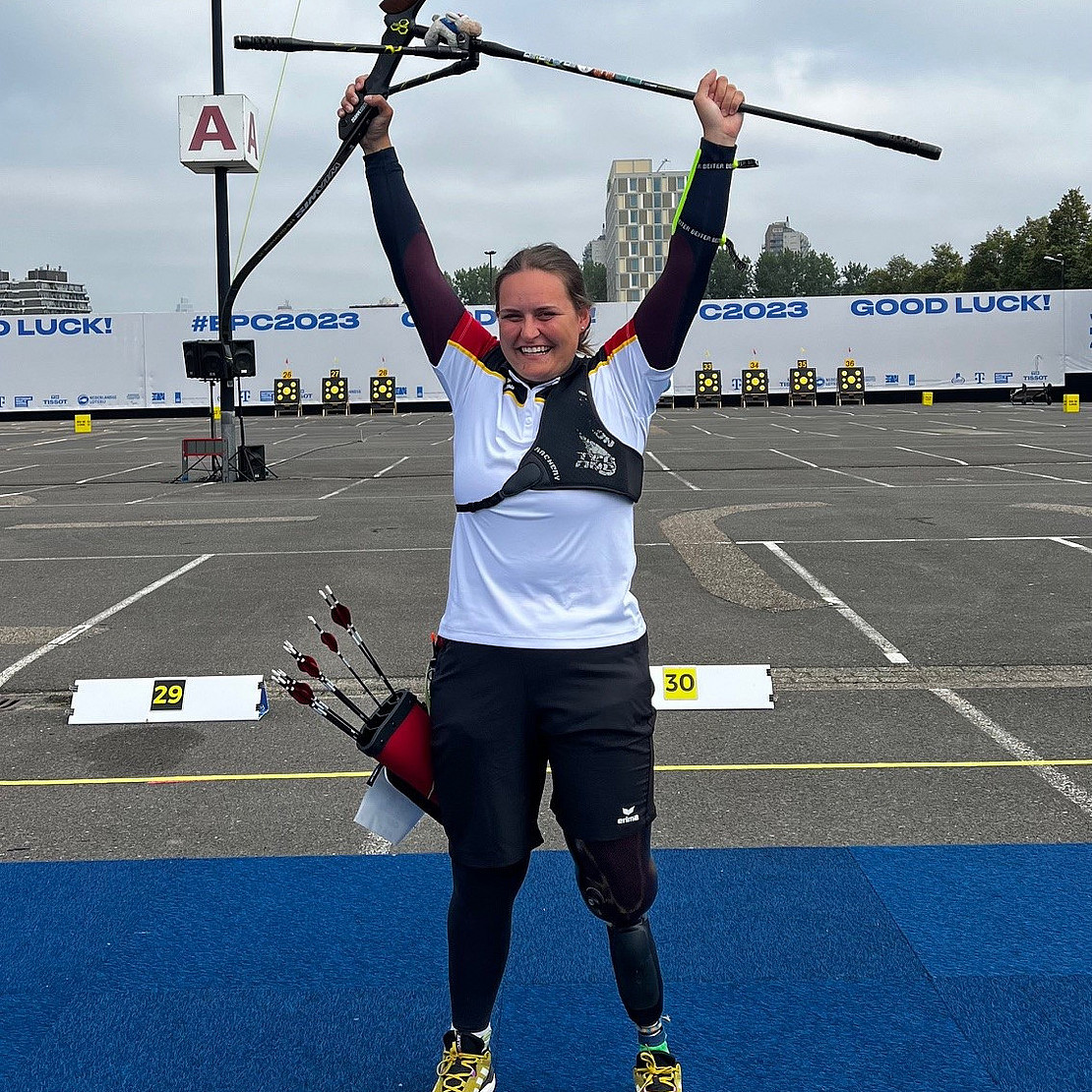This page contains automatically translated content.
The goal clearly in sight: Flora Kliem is aiming for the Paralympics in Paris
"I've always mentioned 'Paris 2024' as my goal in interviews in recent years. But I never believed it would really happen." That's what Flora Kliem says. She is 26 years old, is studying to be a primary school teacher at the University of Kassel - and is probably going there this summer: to Paris, to the Paralympic Games. She will be the only archer there to compete for Germany. "I'm really looking forward to it," she emphasizes. "It's something very special to be going there as 'Team Germany' with athletes from all kinds of different sports."
Flora Kliem was born in Berlin, but has now lived in Göttingen for eight years. As she had always wanted to work at an elementary school, she decided to study to become a teacher at the University of Kassel. She is now in her eighth semester - her studies will probably take a little longer, as competitive sport is very time-consuming. Four to six times a week she is on the course with her bow for training. Most weekends are reserved for tournaments and competitions. And in between, whenever possible, she gives beginners' courses at her sports club, including for long-term patients from the children's hospital in Göttingen.
'Her club' is ASC Göttingen, the reason why she never moved to Kassel. "Without the support I've received from ASC in recent years - both financially and in general - I would never have been able to pursue this sport so ambitiously," she says. Her parents would not have been able to do this in the same way, as Kliem has five siblings. Since this year, the athlete has also been supported by Deutsche Sporthilfe (German Sports Aid); previously, she financed herself with the help of a scholarship. "I get the money to compensate for the fact that my studies are extended by the sport, the many training and competition times," explains Kliem. The national team's budget provides her with additional equipment, such as her latest second bow; travel expenses for competitions are also covered.
But why archery of all things? "I tried archery for the first time in rehab back in 2014, after my accident - but several times a week," she explains. At the age of 15, Flora Kliem had a serious accident that resulted in a polytrauma. She says of her subsequent recovery: "I sometimes think that I have really amazing self-healing powers - and to be honest, I was also incredibly lucky." As part of her treatment, she learned about archery, a recognized rehabilitation sport for back injuries, and immediately enjoyed it.
Until a year ago, Flora Kliem was still in a wheelchair and shot sitting down. She then decided to have an amputation, thanks to which she was finally able to learn to walk again. "I'm missing my lower left leg from the knee down, and I also have several stiffnesses in my back," she explains. This poses a particular challenge when standing, as she lacks balance and stability - essential for archery. She therefore uses a self-made aid that stabilizes her when standing: "It doesn't really have a name, I just call it a 'standing chair'. They also look different for everyone because they are always home-made."
In general, the para-athlete speaks very positively about her competition experiences: "You get to meet so many cool, international people at these competitions. And the atmosphere is always totally supportive - but maybe that's also down to the sport." Because in archery, as we all know, you compete alone: If you miss in a competition, you really only have yourself to blame, she explains and laughs.
And what about Paris? After the archer was able to secure the quota place for Germany at the 2023 Paralympic Games in August, she hopes that it will actually go to her in the end. But the probability is high - after all, she is currently number 1 in Germany, with the country's highest squad status in her starting class.

"In the end, all children would benefit from this ..."
Flora Kliem began her studies at the University of Kassel in 2020 - during the coronavirus pandemic, in an online semester. Due to digital teaching, nobody knew at first that she was in a wheelchair, because nobody could see her. Some of the courses were about inclusion in elementary school, she says. "I experienced some very unpleasant comments from my fellow students, who would certainly have reacted differently in person," recalls Kliem. "But in the end, it's individual people and not the masses. Most of them were and are supportive." She is pleased with the commitment of many lecturers who, for example, make it possible for her to take part in excursions. There are also certain facilitations for students with disabilities, such as preferential course selection, as it can be more difficult to change location, for example. She still sees room for improvement in terms of accessibility at the university: "There are lots of elevators in every building at the AVZ, which is great. But otherwise it is still difficult to move around the campus in some places." However, this is not just an issue at the university, but applies to Germany in general.
The prospective teacher has a lot of positive things to report from her practical experience so far. Although she was warned in advance that children might be afraid of her and her disability, this has not proved to be the case for Kliem. Nevertheless, she sees it as her duty to raise awareness of the issue. "I once explained to a child that 'disabled' is not an insult and that it's not bad if I say that about myself, because it's true. It made her jump for joy," she recalls with a smile. And what does the prospective teacher think about inclusion in schools? "I think merging special and mainstream schools is actually great. In my opinion, this would ultimately benefit all children," emphasizes the student. However, it is crucial to take the special needs teachers with you and integrate them into the classes as well. She has a positive outlook on the new special needs education course at the University of Kassel: "We absolutely need special needs teachers, they are indispensable - regardless of the given school or class constellations."
This article appeared in the university magazine publik 2024/2. Text: Lisa-Maxine Klein

